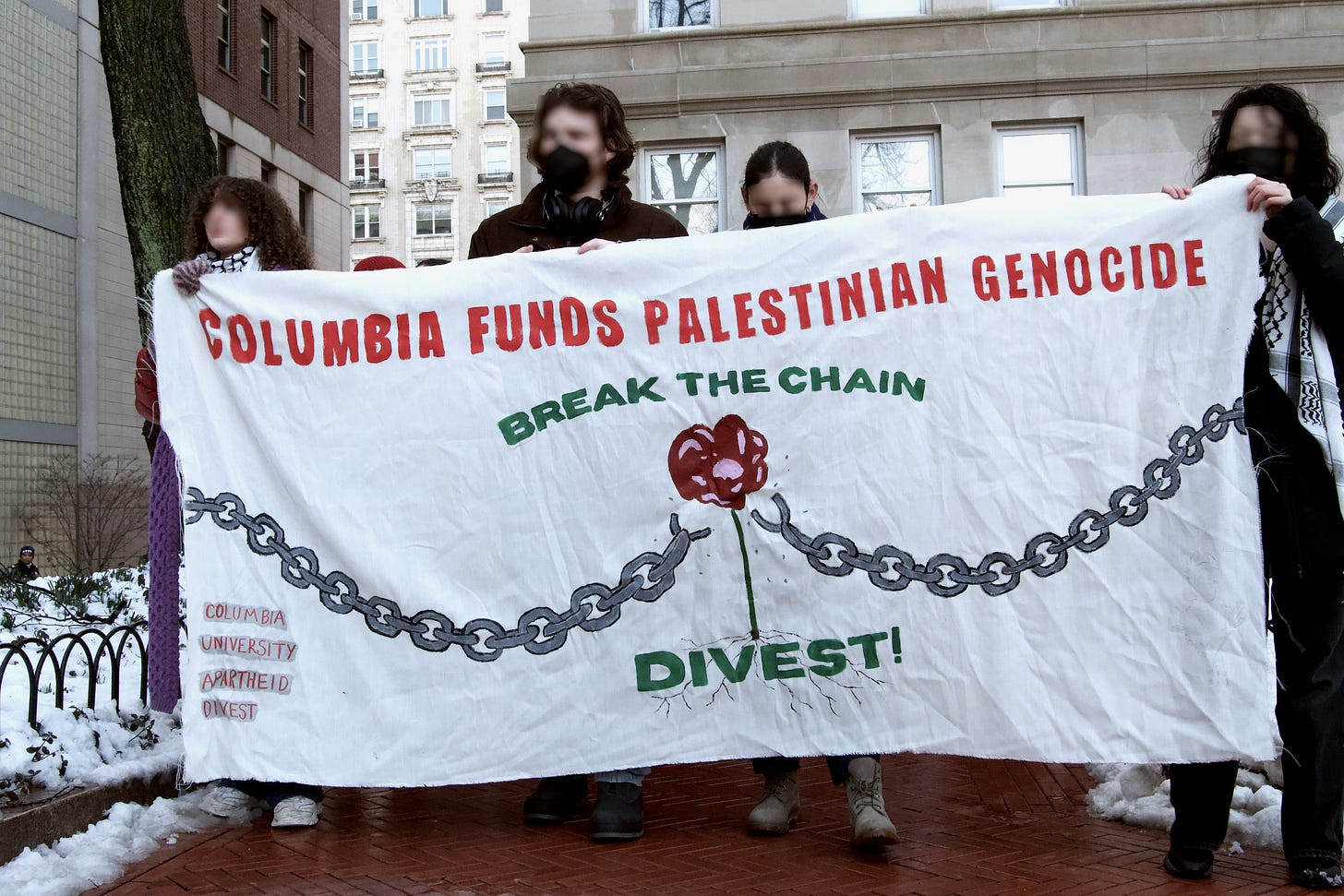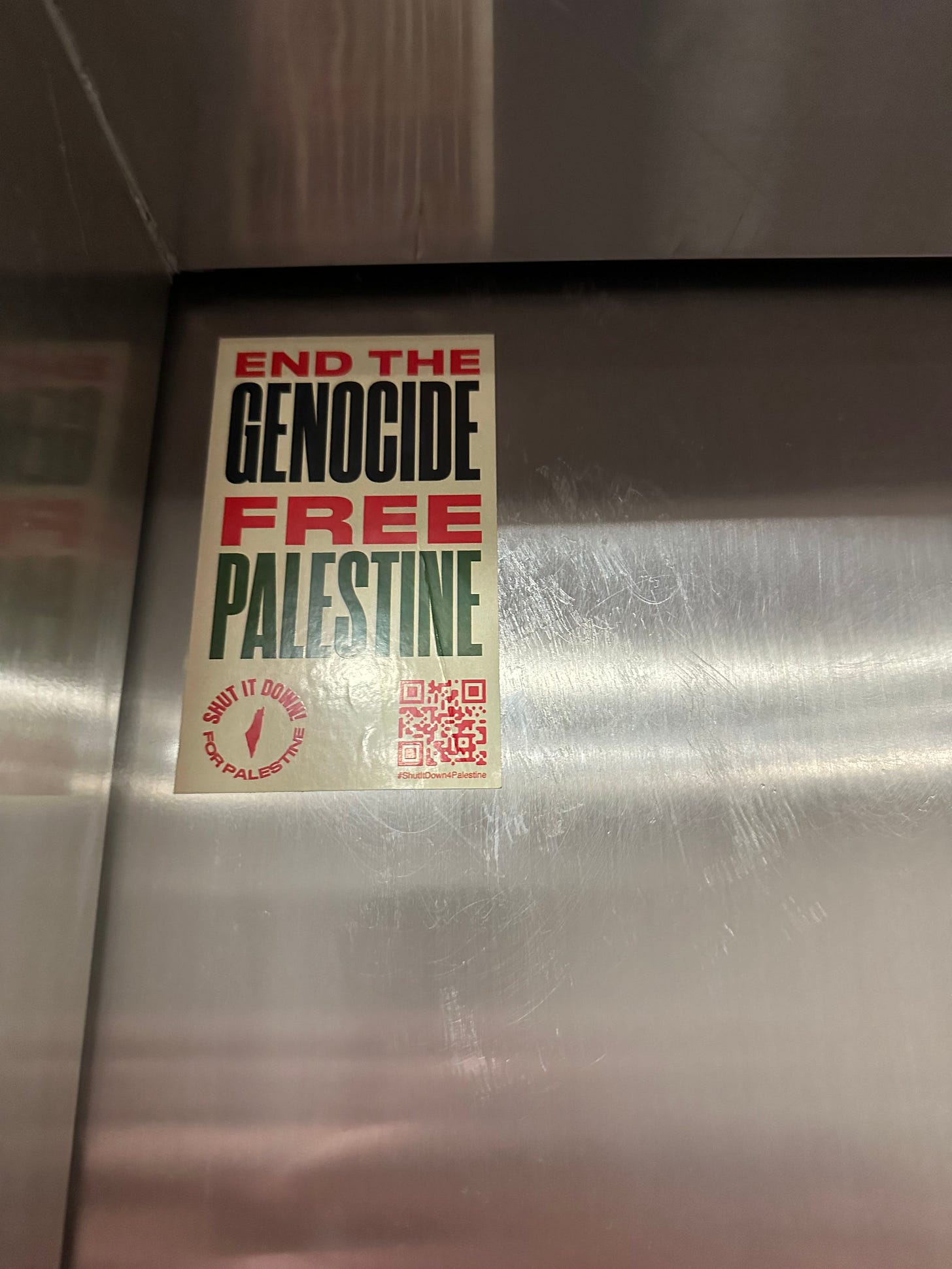Genocide: The War for a Word
A Jewish perspective on the careless use of a controversial term

A common argument I hear pro-Palestinian activists make is that Jews and Zionists shouldn’t characterize their rhetoric as “harmful” when the real harm is against civilians killed in Gaza. For example, in a February 13 op-ed in the Columbia Daily Spectator titled “What are the politics of respectability during a genocide?” the writer wrote:
I question why our focus is on the elite college campuses and their use of language over the horrific injustices being committed against the Palestinian people. There is absolutely no reason to be centering the feelings of privileged college students over the victims of an actual genocide…To those who complain about our slogans making them feel unsafe: Are you unsafe, or are you uncomfortable? Palestinians in Gaza are unsafe due to bombs raining down on them.
As a Jewish student, I can attest that the slogans of groups like Students for Justice in Palestine (SJP) and Jewish Voice for Peace (JVP) do bring real harm to my community. It is not just a feeling of mere discomfort. It is indisputable that Palestinians in Gaza are unsafe. However, as students here at Columbia, that fact does not minimize the consequences of harmful language for the Jewish community; the two are not mutually exclusive.
In particular, the word “genocide” has been in the spotlight since October 7th. If we are to use this term so often, we must understand the term—what it is, what it isn’t, and how we can ensure it never happens. But groups like SJP and JVP, in their fiery invocations of the term in rhetoric and protest, make that much more difficult. They throw “genocide” around on social media and in protests, riling up crowds and disrespecting the term’s heavy history, weight, and meaning for Jews and non-Jews alike. Unfortunately, their usage of “genocide” is free from historical context, which serves only to feed the fire, obscure the facts, and damage the possibility of productive debate and discussion.
Seventy-six years ago, in a world still reeling from the Holocaust, the UN met in Paris at the Genocide Convention and defined the term as “acts committed with intent to destroy, in whole or in part, a national, ethnical, racial or religious group.” Today, 153 nations, including Israel, accept this definition, which should anchor how we use the term.
To date, over 30,000 civilians have died in Gaza, according to the Gaza Ministry of Health. That is a truly disheartening loss of innocent lives that everyone should mourn. Unfortunately, the war there is not the only active conflict killing tens of thousands of civilians—in Ukraine, for example, at least 10,000 Ukrainian civilians have died since the Russian invasion began. The current war in Gaza is precisely that: a war. We cannot assume every inter- or intrastate conflict to be a genocide, even if casualties fall disproportionately on one group, because overuse of the term downplays the existence of actual genocidal states in the world.
The reality is that Israel has no desire or intention to ethnically cleanse Palestinians. Presently, 1.9 million Palestinian Arabs live in Israel and are full Israeli citizens. If Israel were a genocidal regime like China, they would promptly be sent to “re-education camps” like the 1 million Muslims and Uyghurs of Xinjiang were, or like the more than 100,000 Japanese Americans interned in the United States during World War II. Unlike present and past genocidal regimes, Israelis and the IDF are not purposefully trying to “eradicate” Palestinians in the war. They seek only to eradicate Hamas from the Gaza Strip. It is terrible that when Israel responds to Hamas’ continued attacks from known strongholds like Rafah, Palestinian civilians are killed, but Israel’s actions reflect the realities of fighting militants in a dense urban environment rather than a war of annihilation against Palestinian civilians.
Herein lies the harm of flinging the term “genocide” around. Many of Israel’s earliest residents were Holocaust survivors, including the ancestors of many Jews on campus. Falsely accusing Israel of genocide invokes this history of extreme suffering and mass murder, which can be deeply distressing for Jewish students. It’s not that a state established to protect its citizens from genocide is necessarily incapable of committing genocide itself—it’s that when the term “genocide” is blatantly and falsely thrown around, the discourse surrounding Israel becomes laced with accusations that evoke historical persecutions of Jews, making many Jewish students on campus feel targeted or unsafe.
Especially when Israel is at war against a designated Foreign Terrorist Organization like Hamas, the accusation becomes even more sickening, considering what the terrorist group did and would do to Israeli Jews. Their founding charter mobilizes its members in a “Jihad” against the Jews, not just Israel. They wrote, “The Day of Judgment will not come about until the Moslems fight the Jews, when the Jew will hide behind stones and trees.” Even when they updated their Charter in 2017, they kept their aims of “resisting the occupation” of the State of Israel “with all means and methods,” emphasizing “armed resistance.” If anything, Hamas’ agenda is the genocidal one, proclaiming their intent for open war against the Jewish people.
Considering Hamas’ aims, it’s disheartening and bizarre to hear other popular protest slogans such as, “NYPD, KKK, IDF, they’re all the same.” One of these is not like the rest. Like invoking the term “genocide,” invoking the KKK evokes a traumatic past of their attacks on Jews and people of color in pursuit of white Anglo-Saxon purity. Throughout the early 20th century, the Klan physically targeted Jewish leaders, businesses, and individuals simply because of their ethnicity and religion.
Furthermore, compare Hamas’ founding charter with the IDF’s Ruach Tzahal (Code of Ethics), which states, “All humans are to be valued, regardless of race, creed, nationality, gender, status, or role.” Neither the KKK nor Hamas would agree with that statement. By and large, the IDF is not targeting Palestinian civilians simply because they are Palestinian in the same way the Klansmen targeted Jews or Hamas terrorists targeted Israeli civilians on October 7. There are indeed bad actors in the IDF who have demonstrated bigotry towards the Palestinian people. However, unlike Hamas the IDF has pledged to discipline those who act inappropriately and maliciously: There is a fundamental difference between a group that was founded for self-defense and one that was founded on the obliteration of the Jewish state and people in the name of Palestinian liberation. Despite the IDF’s efforts to facilitate the evacuation of Gazan civilians, it is tragic that Palestinian civilians are still dying in large numbers. But that reality is still a far cry from the genocide that groups like the KKK advocated for.
It’s worth noting that the comparison between the NYPD and the KKK is also counterproductive. Protestors in Morningside Heights were not arrested or restrained because of their race or ethnicity but because they physically assaulted and obstructed the duties of officers, both of which are punishable offenses. If anything, the presence of more law enforcement is the best hope to prevent another skunk spray incident.
SJP and JVP’s slogans misuse the past, creating a dangerous environment for Jewish students. Uninformed students may see these accusations of genocide and comparisons to the KKK and react strongly against “the other side” consisting heavily of Jews, making real-life antisemitic incidents all the more likely. One example—following the skunk spray incident on January 22, flyers emerged on campus depicting the Israeli flag and its Star of David over an image of a skunk. At best, the imagery is a highly insensitive response to the skunk spray incident, and at worst, it is the same imagery of Nazi propaganda, depicting Jews and Israelis as vermin in an attempt to arouse anger. The House Committee on Education and the Workforce’s letter to the Columbia administration outlines eight more pages of antisemitic incidents on campus since October 7th, including harassment and physical assault. These incidents aren’t just “feelings” of discomfort. They represent a lack of physical and emotional safety that has barely been discussed and are the product of scapegoating for a “genocide” that doesn’t exist.
As a campus and community, we must be more aware of the historical weight of terms like “genocide” and how they can evoke profound emotions for Jews and Palestinians alike. The two groups can and should coexist peacefully on campus, but this is only possible if we are aware of the consequences of our language. We as a University must uphold our central values of tolerance, scholarship, and anti-bigotry to ensure that everyone, including my fellow Jews and I, feels that their history and struggles are honored.
Mr. Engel is a junior at Columbia College studying history. He is a staff writer for Sundial.



